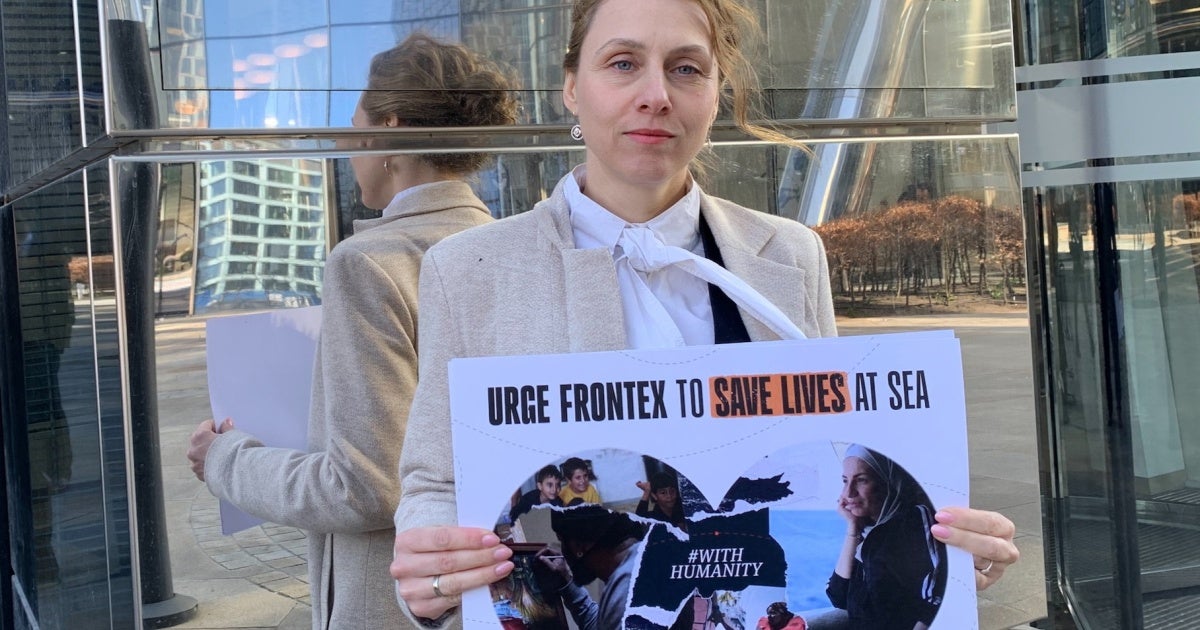(Brussels, April 14, 2025) – Frontex, the European Union’s Border and Coast Guard agency, should ensure that its aerial surveillance capacity is used to save lives at sea, Human Rights Watch said today. The organization met with Frontex Executive Director Hans Leijtens on April 2, 2025, to deliver an EU-wide petition calling on the agency to take concrete steps that would enable more timely rescues of vessels in distress.
“The shocking death toll in the Mediterranean requires concerted action,” said Judith Sunderland, associate Europe and Central Asia director at Human Rights Watch. “As an actor at sea, Frontex has a responsibility under international law to use its resources to facilitate rescues that end in disembarkation of rescued people in a safe place.”
Over the last decade, at least 31,700 people have died or been reported missing in the Mediterranean Sea, according to the International Organization for Migration. More than three-fourths of these deaths and disappearances occur in the Central Mediterranean, between North Africa and Italy/Malta, making it by far the deadliest stretch.
The petition calls on Frontex to take clear steps to uphold its EU and international human rights obligations by prioritizing saving lives at sea. The agency should ensure that information about boats in distress sighted by Frontex aircraft is shared with nongovernmental rescue ships in the area. It should issue more frequent emergency alerts that go to all vessels and provide continuous monitoring as much as possible of vessels in distress.
Frontex should address any current constraints on its ability to take these steps, Human Rights Watch said. This includes ensuring it can operate on a broad interpretation of distress that reflects the foreseeable danger facing unseaworthy boats at sea and the positive obligations attached to the right to life.
In December 2024, a group of United Nations agencies, along with the Centre for Humanitarian Action at Sea, called jointly for a “broad understanding of distress,” resulting in a humanitarian and precautionary approach to identifying and responding to distress situations.”
The European Commission has signaled its intention to significantly expand Frontex by tripling its standing corps to 30,000 border guards and to review its mandate in 2026 to increase its role in deportations. Frontex’s size, role, and responsibilities have grown significantly since it was created in 2004. The agency’s mandate was significantly expanded already in 2019 when a revised regulation expanded its tasks and empowered it to have a standing corps of 10,000 border guards. Frontex’s annual budget skyrocketed from €142 million in 2015 to €922 million in 2024.
Any changes to Frontex’s mandate should strengthen rather than dilute its human rights standards, transparency, and accountability, Human Rights Watch said. This would include making sure that providing Frontex assets and services to member states is conditional on a broad definition of distress, cooperation with humanitarian organizations, and monitoring of distress cases and rescue operations.
The petition delivered to Frontex is part of the Human Rights Watch #WithHumanity campaign. Almost 18,000 people signed the petition, with almost half of all signatures coming from Italy, which is on the front lines of rescue-at-sea efforts, with the remaining signatures primarily from France, Germany, Spain, and Sweden. Twenty-two nongovernmental organizations supported the initiative. The overall engagement with the campaign reflects strong support for measures to address the appalling loss of life in the Mediterranean Sea, Human Rights Watch said.
A 2022 analysis by Human Rights Watch and Border Forensics of Frontex aerial surveillance concluded that the agency’s practices make it complicit in well-documented abusive and indefinite arbitrary detention and other serious human rights violations in Libya.
While largely abdicating responsibility for search-and-rescue operations since 2017, the EU and its member states have focused on shoring up the ability of countries on the southern rim of the Mediterranean Sea to patrol their coastlines. Aerial surveillance by Frontex in the Central Mediterranean is part of this strategy: the agency shares the location of migrant boats it spots with relevant EU member states but also with authorities in Libya and Tunisia. This enables interdictions followed by returns to those countries, where migrants face serious human rights abuses.
As an EU agency, Frontex has human rights obligations under the EU Charter of Fundamental Rights as well as under the 2019 Frontex Regulation and the agency’s own Fundamental Rights Action Plan. International human rights law obliges Frontex to refrain from violating anyone’s human rights directly and not to expose them indirectly to serious violations of those rights, such as torture, elsewhere. The agency should therefore take steps to mitigate the human rights risks of its intelligence-gathering and border management activities. Frontex is also bound to protect the right to life, including by taking positive steps to prevent loss of life where there are foreseeable threats and life-threatening situations.
“People across the EU are sending a message that no one should be left to die at sea,” Sunderland said. “As warmer weather may see more attempts to cross the Mediterranean, Frontex should act now to ensure it does everything it can to prevent avoidable tragedies.”



